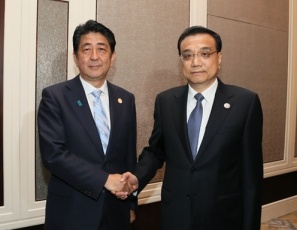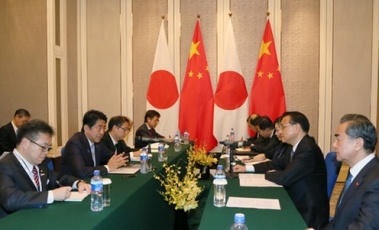Japan-Mongolia Relations
Japan-China Summit Meeting
July 15, 2016
 Photo: Cabinet Public Relations Office
Photo: Cabinet Public Relations Office
 Photo: Cabinet Public Relations Office
Photo: Cabinet Public Relations Office
On July 15, commencing at around 2:30 p.m. for approximately 30 minutes, Mr. Shinzo Abe, Prime Minister of Japan, who is visiting Ulaanbaatar, Mongolia to attend the 11th Asia-Europe Meeting (ASEM 11) Summit Meeting, held a Japan-China Summit meeting with H.E. Dr. Li Keqiang, the Premier of the State Council of the People's Republic of China. The overview of the meeting is as follows.
During the meeting, the two leaders mutually expressed their condolences over the casualties caused by the terrorist attack in Dhaka and the Chinese peacekeepers who lost their lives in South Sudan.
1 In his opening remarks, Premier Li Keqiang noted that this is his first meeting with Prime Minister Abe in eight months and that there is high media interest in whether or not the momentum of improvement in the Japan-China relationship can be sustained. Premier Li Keqiang stated that he wants Japan to comply with the four basic documents and strive to improve the relationship between Japan and China in line with the spirit of facing history and looking toward the future and that he hopes to frankly exchange views on issues of interest to both sides at this meeting.
2 In response, Prime Minister Abe explained that he is pleased to meet Premier Li Keqiang again, and although difficult issues remain between Japan and China, he hopes to proactively address common challenges. Prime Minister Abe stated that in particular, in light of the issue of the United Kingdom deciding to leave the European Union, he hopes to cooperate in the run-up to the G20 Summit to ensure that the global economy does not face a crisis, and that he also intends to further deepen cooperation with the international community, including China, so that terrorism does not permeate Asia.
3 In the exchange that followed, Prime Minister Abe stated the following:
Japan has always advocated the importance of peacefully resolving disputes based on the "rule of law."
The two leaders also held a frank exchange of views regarding the East China Sea.
6 Through the meeting, the two leaders shared views on the following points:
During the meeting, the two leaders mutually expressed their condolences over the casualties caused by the terrorist attack in Dhaka and the Chinese peacekeepers who lost their lives in South Sudan.
1 In his opening remarks, Premier Li Keqiang noted that this is his first meeting with Prime Minister Abe in eight months and that there is high media interest in whether or not the momentum of improvement in the Japan-China relationship can be sustained. Premier Li Keqiang stated that he wants Japan to comply with the four basic documents and strive to improve the relationship between Japan and China in line with the spirit of facing history and looking toward the future and that he hopes to frankly exchange views on issues of interest to both sides at this meeting.
2 In response, Prime Minister Abe explained that he is pleased to meet Premier Li Keqiang again, and although difficult issues remain between Japan and China, he hopes to proactively address common challenges. Prime Minister Abe stated that in particular, in light of the issue of the United Kingdom deciding to leave the European Union, he hopes to cooperate in the run-up to the G20 Summit to ensure that the global economy does not face a crisis, and that he also intends to further deepen cooperation with the international community, including China, so that terrorism does not permeate Asia.
3 In the exchange that followed, Prime Minister Abe stated the following:
- I appreciate that Premier Li Keqiang is steering the Chinese economy, including structural reform, amid the uncertain global economic outlook. In order to bolster cooperation on the economic front, I hope to promptly hold a high-level economic dialogue between Japan and China. I hope to pursue concrete cooperation in fields such as the macro-economy, financial and monetary affairs, and energy-saving and the environment.
- I also hope to pursue concrete cooperation on countering terrorism.
- Together with China, Japan hopes to strongly urge North Korea to exercise self-restraint against provocative actions and comply with United Nations Security Council (UNSC) resolutions and other measures. The UNSC should make further responses to the recent ballistic missile launches. I intend to continue coordination.
- With the "Mutually Beneficial Relationship Based on Common Strategic Interest" as the starting point, I hope that both sides will devote efforts to proactive cooperation and exchanges, including enhancing youth exchanges.
- Terrorism is a global issue, and Japan and China should cooperate in response to the threat of global terrorism.
- Market changes are occurring due to the impact of the United Kingdom's decision to leave the EU, but I hope Japan and China will firmly cooperate to ensure that a financial crisis does not return.
- With regard to the Japan-China relationship, after securing a grasp of the general direction I hope to realize strategic mutual interests through mutual cooperation. I sincerely welcome Prime Minister Abe's visit to China for the G20 Summit in September.
Japan has always advocated the importance of peacefully resolving disputes based on the "rule of law."
The two leaders also held a frank exchange of views regarding the East China Sea.
6 Through the meeting, the two leaders shared views on the following points:
- Japan and China will cooperate to ensure that terrorism does not permeate Asia. The recent attack in Nice could never be tolerated either.
- Ahead of the G20 Summit that will be held in China in September, Japan and China will cooperate in order to rebound the world economy and achieve powerful growth.
- Outstanding issues of concern also exist, but both Japan and China are partners that are essential to one another, and with the "Mutually Beneficial Relationship Based on Common Strategic Interest" as the starting point, Japan and China will advance its relationship.

